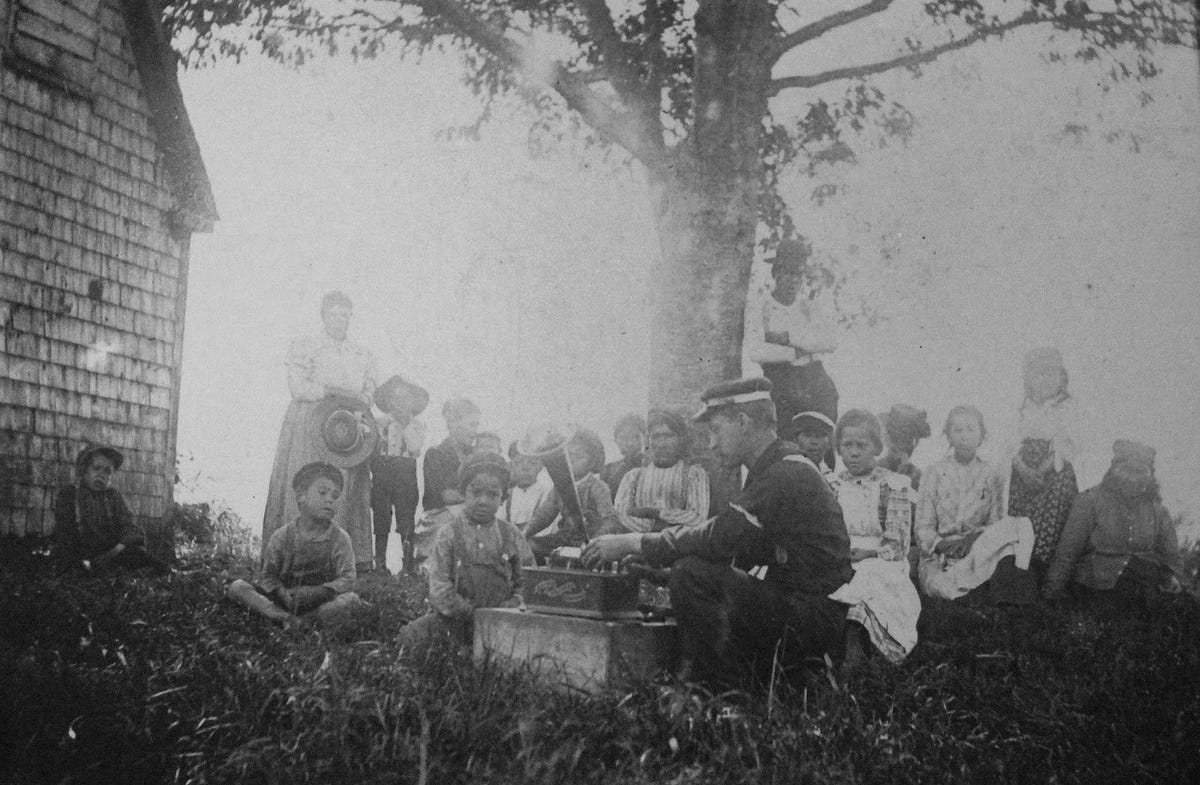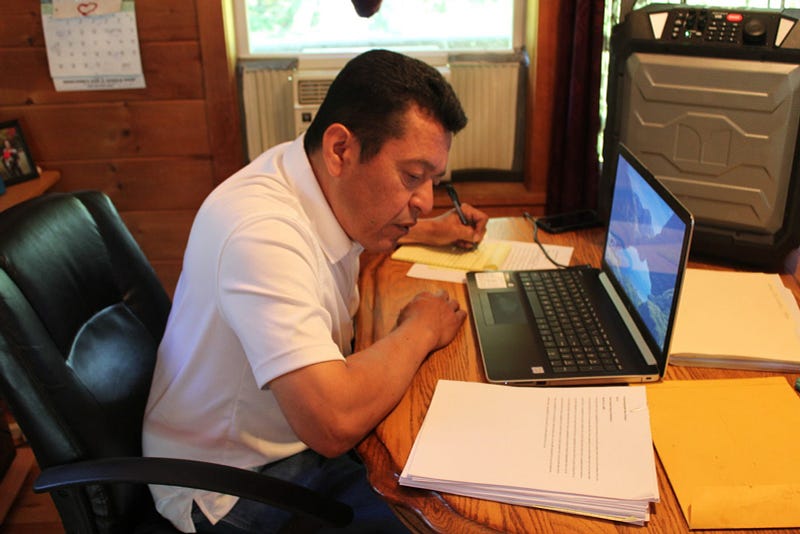
In 01890, anthropologist Jesse Walter Fewkes traveled to Eastern Maine to document the Passamaquoddy Tribe. By then, war, disease, and unhonored treaties by local and federal authorities had reduced the tribe to a few hundred members.
Fewkes brought with him one of Thomas Edison’s phonographs — a technology less than a decade old. Over the course of several days, Fewkes recorded members of the tribe singing, telling stories, and providing basic pronunciation examples of words for things like numbers and days onto large, wax cylinders in 3 minute increments.
The Fewkes recordings represented a significant ethnographic advancement for the burgeoning field of Anthropology. It was the first time sounds had ever been recorded in the field. The recordings were given to Boston’s Peabody Museum, and acquired by the Library of Congress in 01976. It wasn’t until the 01980s, when the Library of Congress informed the Passamaquoddy of their existence, that any tribal members heard the recordings. The Passamaquoddy discovered that some material that was considered sacred and not meant to be heard outside of the tribe, such as a funeral ceremony, had been available for the general public to listen to for years.
The knowledge of the recordings came at a time of resurgence for the Passamaquoddy following a century of hardship. As E. Tammy Kim, writing in The New Yorker, puts it: “For decades, tribal members had suffered extreme poverty, seen their language banned by the Catholic priests and nuns who oversaw the reservations, and lost their kids to the child-welfare system.” But the Tribe recently won a landmark land claims settlement, and was awarded funds to purchase 150,000 acres of land. This resulted in many displaced tribal members returning to the tribe’s two reservations. Many of these “off-reservation returnees” were disconnected from Passamaquoddy culture. Some had intermarried, and did not speak the Passamaquoddy language. The Passamaquoddy Tribe estimates that 70% of its members could speak the language 30 years ago. Today, only 12% of its 3,600 members are fluent.
Those statistics may soon change. In recent years, technological advances in audio restoration, coupled with Passamaquoddy activism around preserving tribal culture and language, has led to the Library of Congress launching a new project of “digital repatriation” for the Passamaquoddy recordings called “Ancestral Voices.” The project’s goal is to confer curatorial control of the recordings back to the Tribe.
The process of enacting digital repatriations involves both technological and anthropological hurdles. The recordings are first cleaned for clarity of sound. There is still the crackle of age, but the content is now clearly audible and understandable. Next is the assignment of “Traditional Knowledge Labels,” a system developed by Professor Jane Anderson of New York University. Traditional Knowledge Labeling is “‘designed to identify and clarify which material has community-specific restrictions regarding access and use.”

This label, Ma yut monuwasiw, means ‘This is not sold’- a recording with this label designates it as strictly not for commercial use. 
This label means ‘Educational’- Ekehkimkewey- It will be found next to recordings that the Passamaquoddy have allowed to be shared for educational purposes.
These labels work to prevent future mis-use of indigenous recordings and ensure that sacred material culture stays within the community and not widely disseminated, as has happened in the past.

The transcription, translation and interpretation of the recordings required speakers of the Passamaquoddy language. In an interview with Art Canvas, Dwayne Tomah, a current member of the Passamaquoddy Tribe, found this to be an emotional and poignant process:
“I really wept. Hearing their voices. Knowing that I’m probably one of the last fluent speakers on the reservation. And that we’re still continuing this process to be able to revitalize our language and bring it back to life again, so to speak. And give it some attention that it really deserves.”
One of the main results from the digital repatriation was the creation of the Passamaquoddy Peoples’ Knowledge Portal. The entire recording collection can be found here, along with historical context, films, vocabulary guides and photographs. This website provides continuity between the past, present and future of the Tribe, providing a space and access for future Passamaquoddy generations to learn ancestral and traditional knowledge.

“Language is both an embodiment of human culture, as well as the primary means of its maintenance and transmission,” writes Dr. Laura Welcher, a linguist and Director of Long Now’s long-term language archiving Rosetta Project. “When languages are lost, the transmission of traditional culture is often abruptly severed.” In seeking to correct erasures, reverse the extinction of languages, and reconstitute ritual, repatriation projects aim to restore this cultural transmission. Once indigenous people hear the voices of their ancestors that has previously been denied to them, it empowers them to reclaim their voice in the here and now.
Learn More
- Explore the Passamaquoddy Peoples’ Knowledge Portal, where you can listen to Fewkes recordings.
- Read E. Tammy Kim’s piece in The New Yorker on the digital repatriations project.
- Learn more about the usage of Traditional Knowledge labels.